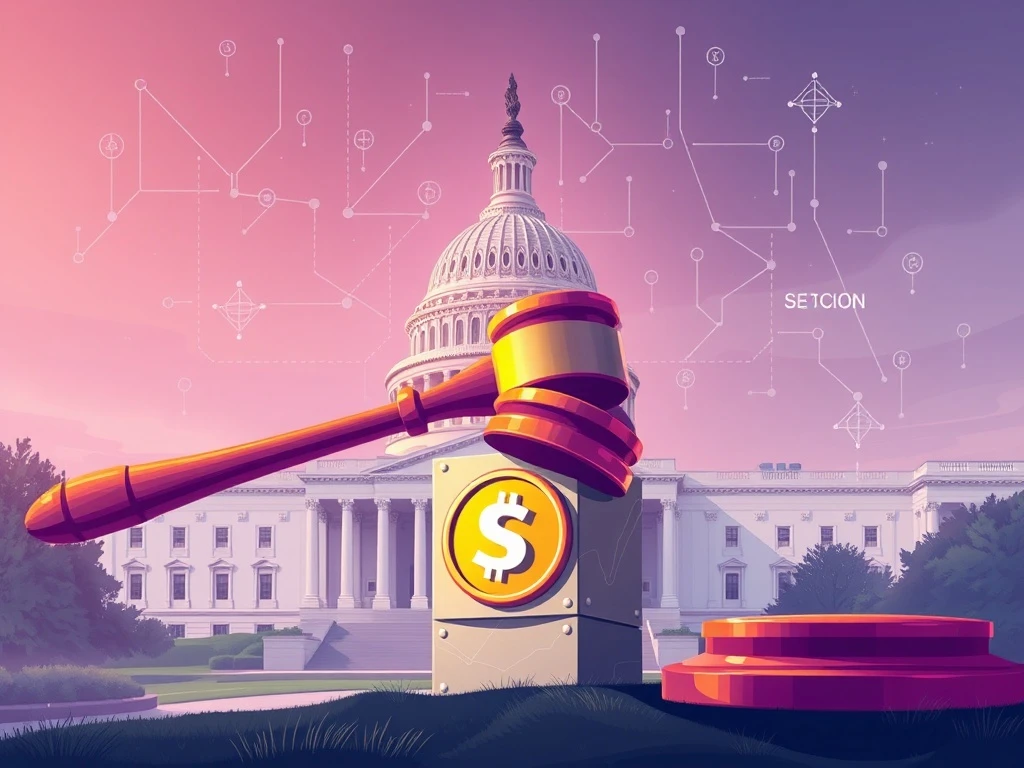Stablecoin Regulation: Unprecedented GENIUS Act Set to Reshape US Crypto Landscape

A monumental shift is on the horizon for the digital asset space, particularly for stablecoins. The crypto community is buzzing as the Guiding and Establishing National Innovation for US Stablecoins Act, widely known as the GENIUS Act, makes its way to President Donald Trump’s desk. This legislative milestone is poised to fundamentally alter how stablecoins operate, not just within the United States but potentially influencing global markets. For anyone invested in or observing the crypto world, understanding the implications of this new crypto law is crucial.
What is the GENIUS Act and Why Does it Matter for US Stablecoins?
The GENIUS Act represents a significant step in establishing a clear regulatory framework for stablecoins. After navigating multiple delays, the US House of Representatives passed this pivotal bill with a vote of 308-122. Originating in the Senate, its passage by the House means it now only awaits the President’s signature to become law. Reports indicate a signing ceremony is anticipated, marking its official enactment. The law will take effect 18 months after signing, or 120 days after key regulators, including the Treasury and Federal Reserve, issue final implementing regulations.
This legislation is not merely a formality; it’s designed to bring clarity and structure to a segment of the crypto market that has grown exponentially. The primary goal is to dictate how issuers of stablecoins must be regulated to serve the US stablecoins market, aiming to foster innovation while ensuring consumer protection and financial stability.
How Will Stablecoin Regulation Impact Issuers?
One of the most profound changes introduced by the new stablecoin regulation concerns the operational structure of stablecoin issuers. Logan Payne, a crypto-focused lawyer at Winston & Strawn, highlights a significant incentive for these issuers to pursue banking licenses.
- Limited Scope of New Licenses: The GENIUS Act creates a new stablecoin license, but it strictly limits a company’s activities to ‘purely stablecoin issuance.’ This poses a challenge for most current stablecoin issuers, who typically engage in a broader range of activities beyond just issuing tokens.
- State-Level Hurdles: Even with a GENIUS Act-approved license, issuers would still need to acquire state-level money transmission licenses to operate nationally, adding layers of complexity and cost.
- Incentive for National Charters: This regulatory landscape creates a strong push for stablecoin issuers to apply for national trust bank charters with the Office of the Comptroller of the Currency (OCC), similar to steps taken by entities like Circle and Ripple. An OCC charter allows for stablecoin issuance alongside a wider array of financial activities, critically, without the need for numerous state-specific licenses. This streamlines operations for compliant entities.
The End of Yield? A Key Change in Digital Asset Legislation
Perhaps one of the most contentious aspects of this new digital asset legislation is the ban on interest or yield offerings for stablecoin holders and users. This applies to both foreign and US-regulated issuers. Yield offerings have been a significant marketing tool for stablecoins, attracting users by promising returns on their holdings, whether natively or through arrangements with exchanges.
The ban suggests a fundamental re-evaluation of how stablecoins can attract and retain users. It is expected that many existing yield-generating arrangements, such as those seen with Circle’s USDC on platforms like Coinbase and Kraken, will need to be significantly altered or cease altogether. This shift could redefine the value proposition of holding stablecoins for many users, focusing more on their utility for transactions and remittances rather than passive income generation.
Crypto Law and DeFi: Navigating New Uncertainties
The GENIUS Act, while addressing stablecoins directly, leaves certain aspects of decentralized finance (DeFi) largely unaddressed, leading to a period of potential uncertainty. Logan Payne notes that the bill’s impact on DeFi is ‘intentionally a bit unaddressed, for now at least.’ This suggests that while the immediate focus is on centralized stablecoin issuers, the broader implications for DeFi platforms that rely heavily on stablecoins will unfold over time.
The expectation is that future legislation and subsequent regulatory actions will fill these gaps. Bills like the CLARITY Act, which aims to classify different types of digital assets and assign regulatory oversight, are already moving through Congress. This indicates a multi-year process of legislative development to comprehensively address the complexities of the crypto ecosystem, including DeFi’s unique structures.
Ensuring Transparency: New Requirements Under the GENIUS Act
A core tenet of the GENIUS Act is enhanced transparency and accountability for stablecoin issuers. The bill mandates that permitted stablecoin issuers must back their tokens 1:1 with reserves of US dollars or other highly liquid monetary products, such as Treasury bills. This provision is critical for maintaining the stability and reliability of stablecoins.
Beyond the backing requirement, issuers will face rigorous reporting obligations:
- Public Reserve Reports: Issuers must publicly disclose the composition of their reserves, offering an unprecedented level of insight into their backing assets.
- Audited Reports: These reserve reports must be examined by a registered public accounting firm, adding an independent layer of verification.
- Regulatory Certification: Issuers are required to submit a certification of the accuracy of these reports to their federal or state regulatory body, ensuring direct oversight.
These measures are designed to build greater trust and confidence in US stablecoins by providing clear, verifiable proof of their backing.
Non-Approved Issuers Barred, Foreign Stablecoins Given Exemptions
The GENIUS Act also introduces strict rules regarding who can offer stablecoins in the US market. Three years after the bill’s signing, it will become illegal to offer any stablecoins that do not originate from an approved issuer. This effectively creates a regulated whitelist for stablecoin providers.
For foreign-issued stablecoins, the bill provides certain carve-outs and requirements:
- Foreign stablecoins can be offered in the US only if their issuer can and will comply with the bill’s legal requirements.
- Exemptions may be granted if the Treasury determines that the foreign country has a comparable regulatory regime.
- Even with comparable regulation, foreign issuers must successfully register with the OCC (with a 30-day response window) and hold sufficient reserves in a US financial institution to cover their US customers.
This dual approach aims to protect the US market while allowing for international participation under strict compliance.
Multiple Agencies to Regulate Stablecoins in the US
The GENIUS Act establishes a comprehensive dual federal and state legal framework for policing stablecoins. It permits various regulated entities – including banks, credit unions, and nonbanks – to issue stablecoins. Depending on their type, these entities will fall under the oversight of different federal agencies:
- National Credit Union Administration
- Federal Deposit Insurance Corporation
- Office of the Comptroller of the Currency
- Treasury
- Federal Reserve
Notably, entities with less than $10 billion in issued stablecoins have the option to be regulated at the state level, provided the state has established a stablecoin regulator. This multi-agency approach reflects the complex nature of stablecoins, blending aspects of currency, securities, and banking within the existing regulatory landscape.
A New Era for Digital Assets
The passage of the GENIUS Act marks a watershed moment for stablecoin regulation and the broader crypto market. By providing a clear framework for US stablecoins, addressing critical issues like reserve backing and issuer licensing, and setting the stage for future digital asset legislation, this bill aims to bring greater stability and legitimacy to a rapidly evolving financial sector. While challenges remain, particularly concerning DeFi and the adjustment to new operational norms, this comprehensive crypto law is poised to usher in a new era of regulated growth and innovation within the digital economy. The industry will now closely watch as the regulations take shape and the market adapts to these transformative changes.









